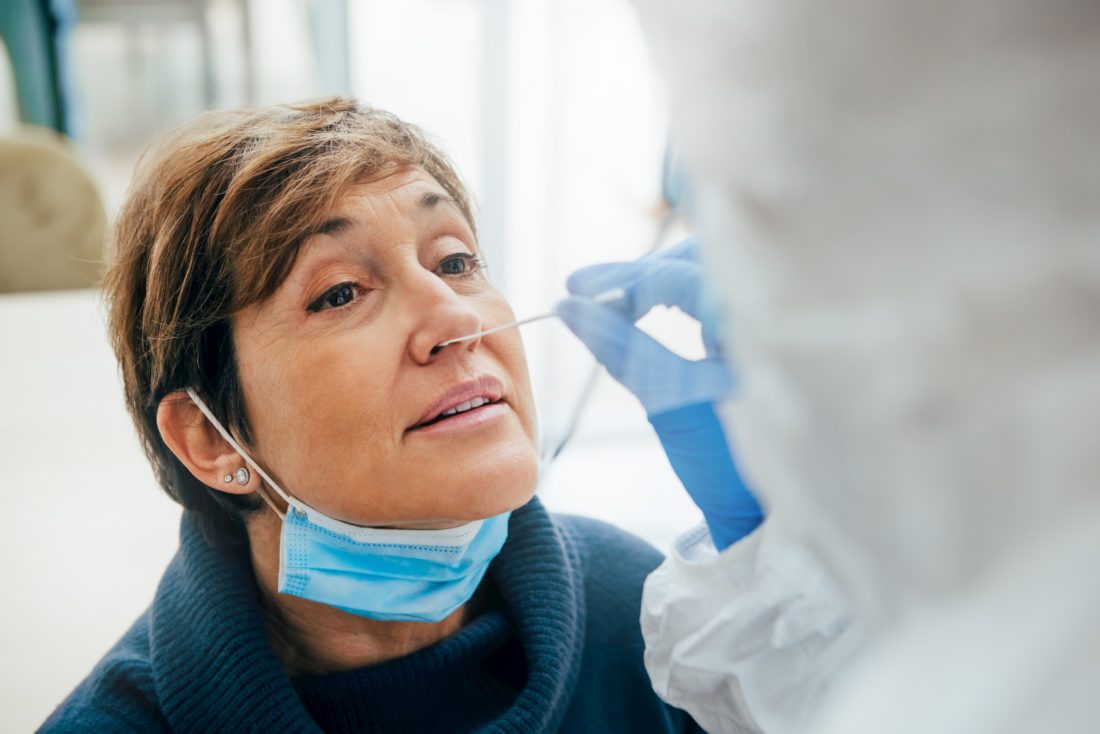
You’re COVID-Positive, Now What?
When you develop symptoms, or have been exposed to someone with COVID-19, the first step is to “isolate from contact with others” and get tested. Once you have a positive test result, it can be confusing to know what to do next. Lyracore founder and critical care and pulmonary specialist, Dr. Alexandre Furman, answered some of the most common questions surrounding a positive COVID-19 test result and gave guidance on what to do next.
What should I do if I have tested positive for COVID-19?
First, and most importantly, stay calm! As long as you isolate yourself and contact your medical provider, you’ll be protecting yourself and others. Once you contact your medical provider, they will guide you as to the next steps. At Lyracore, we have telemedical options for visits with COVID-exposed and COVID-positive patients through their smartphones, computers, tablets and other electronic devices and are able to do an initial evaluation virtually. If deemed necessary, lab work, imaging tests and supportive measures or advanced pharmacological interventions (Antivirals, Anti-bodies etc.) will be suggested as well proper short-term clinical follow-up. By and large, the majority of people are able to stay home and recover, with only minimal and relatively simple support measures.
Some basic steps to keep in mind are:
- Stay home
- Separate yourself from others
- Clean your hands often
- Don’t share things with healthy people
- Monitor your symptoms
- Call ahead for medical care
- Return to work only after recovering
Should I continue taking my medications?
Yes, this is very important. You should continue taking all your medications as you’ve been instructed by your physician, especially if you suffer from asthma, allergies or other immunological or respiratory conditions. You’ll likely stay on the medication or increase your dosage under the guidance of your physician, and, in some cases, they may add something new that could be helpful. It all depends on your symptoms, and your virtual or in-person clinical assessment, as well as as the close clinical follow-up that will help guide your provider on the best course of action.
How many days should I stay home?
The current recommendation – from time of positive result and disappearance of symptoms (cough, body ache, fever) – is to isolate at home for 10 days of isolation. In some cases, when the illness is more severe, 20 days may be recommended.
How do I self-quarantine?
The best way to self-quarantine, if you have family members living in the same home as you, is to choose one room as your quarantine room and try to stay in there as much as possible. If there are multiple bathrooms, use a separate bathroom from the other family members or occupants. In addition to isolating, here are some of the top defenses for not spreading the virus to your family members and other close contacts:
- Frequent handwashing by all family members and all involved in your care
- Avoid touching your face, eyes, nose and mouth
- Wear a mask and gloves as much as possible when awake
- Don’t share food, plates, utensils, cups, bedding or towels
What if I need more care?
If you are sick and need another family member to care for you, it’s best for one family member to be the sole care provider for a 24-hour period. They should wear an N95 mask (and you should too) and make sure all surfaces are kept clean between the infected individual and others by routinely and frequently disinfecting with approved products. (CDC link to approved disinfectant products)
Someone who is caring for a COVID-positive family member should also wear a protective gown, goggles, mask and gloves, and, once they’ve completed care, they should try to get undressed in the patient’s room. After leaving, they should immediately wash their hands and face or use an alcohol-based hand sanitizer (hands only).
What are the most common symptoms – and what should I look out for that might indicate my illness is becoming more severe?
Common reported symptoms of COVID-19 are:
- Shortness of breath
- Progressive breathlessness
- Fevers
- Chills
- Body aches
- Cough
- Diarrhea
- Stomach ache
Other, less common symptoms are:
- Reddening of the eyes
- Unexplained rashes
- Cloudiness of the mind
- Severe fatigue
Severe symptoms, which are concerning and need immediate attention:
- Severe chest pain in any part of the chest (front, back, or sides)
- Very high (>104F) persistent fevers over a course of 24 hrs
- Blood in sputum
- Severe, unrelenting headache
- Decreased oxygen saturation levels
- Swelling in feet, arms or face
- Blue discoloration of tongue, nose, finger-tips or toes
What should I do if I have severe symptoms?
These symptoms are concerning and you should not wait to go to the emergency room if you are experiencing them. When you arrive, immediately state that you are COVID-positive and prepare to be isolated. Always keep your N95 mask in place.
If you can’t transport yourself to the hospital, call 911 and let them know you are COVID-postiive and experiencing severe symptoms.
What should I do if I feel my symptoms are worsening, but not severe, and may need to be seen by a physician?
It’s important to keep in scheduled contact with your medical providers so your condition can be managed appropriately. At Lyracore, we continuously maintain contact with and evaluate our patients, so that we can stay on top of their symptoms. If you feel your symptoms are worsening, call a medical provider so you can be further evaluated and screened by phone to help prevent spreading the virus.
What can I take to help myself feel better?
The usual approach to viral illness is the best course of action to relieve COVID-19 symptoms:
- Rest
- Eat a healthy diet
- Fluids to stay hydrated
- Sleep
- Take your multivitamin and, if approved by your physician, other supplements like Vitamins D, B1 and C, Zinc and Melatonin may be an option
- Pepcid can help for GI symptoms and sometimes with fending off viral symptoms
Do not start taking any medication or supplement, even an over-the-counter product, before discussing it with your provider first
How long does it take to recover?
Recovery time varies widely from a few days in very mild cases to weeks to a few months. Some patients develop protracted symptoms and their recovery takes longer, but, on average, most people completely recover in 2-3 weeks.
Patients with allergies, asthma and immunological conditions don’t seem to be having longer recovery times or more severe illness than the general population. They need to be more closely observed, but living with these conditions does not necessarily mean they will experience more severe illness or longer recovery.
What follow-up care should I get once recovered?
There is no one-size-fits-all recommendation, and you will need to follow the instructions of your physician. At Lyracore, we tend to follow up with patients at least once a week for 2-3 weeks to follow the inflammatory state and monitor for most immediate reported complications.
From there, we will continue to be in contact with the patient for about six to eight weeks to complete some formal testing and assessments of overall lung function, as well as imaging to look for any abnormalities and to determine if there is a need for further assessments.
What are some of the long-term effects or symptoms of COVID-19?
The most commonly reported long-term symptoms are:
- Fatigue
- Shortness of breath
- Cough
- Joint pain
- Periodic chest pain
- Anxiety
- Poor sleep
- Dry cough
Less commonly, long-term symptoms may include:
- Difficulty with thinking and concentration or “brain fog”
- Depression
- Muscle pain
- Headache
- Intermitten fevers
- Fest-beating or pounding heart (also known as heart palpitations)
Severe and more serious complications from COVID-19 do occur. These can include but not limited to:
- Heart failure
- Heart attack
- Brain stroke
- Inflammation of the heart
- Fluid accumulation around lung or heart
- Clotting disorders
- As well as some others – the research and data reporting is ongoing
Continued monitoring of your condition is important so that we can be aware and assess these concerns.
Once I recover, am I immune to the virus? For how long?
That’s a great question – and the answer is that, as of right now, nobody knows. We do know that the immunity is protracted, and the antibodies do appear for a few weeks and disappear over 2-3 months. We aren’t sure if the disappearance of the antibodies means that the patient is at risk again. There is some encouraging data with the vaccine, but we really don’t have 100% confirmation, and won’t for a year or so, when we are able to analyze ongoing rates of infection as well as fully assess vaccination effects.
There is evidence that a repeat infection is possible and multiple cases in the US have been confirmed as a second- infection after a proven first.
Once you have recovered, you should resume current advised social distancing practices, wearing a mask, and all of the other safety measures advised to avoid contracting or spreading COVID-19.
Once I am recovered, when can I get the vaccine?
There is currently no specific recommendation, but you would definitely not want to get the vaccine during the acute phase. I would recommend a 4-6 week delay from acute illness, which is about the time when you would start developing the natural antibodies.
Should I get the vaccine?
The CDC recommends we all get required doses of any particular vaccine in a timely manner. As it stands right now, we do not have enough understanding to know whether one dose is sufficient, and as it stands right now second doses of current, FDA- approved vaccines are necessary, as recommended by the manufacturers. You will need to receive both doses to be considered fully vaccinated. Stay tuned regarding additional versions of vaccines in the next few weeks, produced by other manufacturers. We shall update our information page as such information becomes available.
Do I have a condition that means I would not want to get vaccinated?
This needs to be addressed on a case-by-case basis, and your unique case would need to be discussed with your provider. By and large, vaccination is a safe and effective means of getting protected.
Should I be concerned about variants or mutations of SARS-CoV-2
Variants and mutations of the virus are normal and expected, it is part of how viruses work. The current variant seems to be more infectious and easier to transmit from person-to-person and surface-to-person, and on occasion seem to produce more severe disease. There is nothing new we can do beyond our current preventative measures, so the only thing you can do right now is follow existing instructions.
Will the current COVID-19 vaccines protect from variants and mutations?
The available vaccines seem to be addressing the current variant, but there is ongoing research and data-collection that is continuing to determine efficacy of current vaccines against new viral mutants and variants. This is another reason it is important to continue wearing a mask, practice social distancing, and, if you have tested positive, isolating and disinfecting as mentioned earlier.
We’re here to help.
Lyracore Health Alliance is here to help guide you through this challenging time. From managing pre-existing conditions, to supporting you through a COVID-19 diagnosis and recovery, we’ll consider your unique situation and work with you to develop a solid clinical plan and monitor your condition closely. If you have questions or would like to see a practitioner, set up a telemedicine or in-person appointment today.
